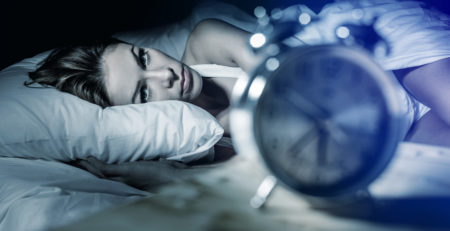Up All Night? Try These Simple Tricks to Sleep Better
Getting a good night’s rest is an essential part of your overall health and wellness, yet many adults fail to get the full seven to nine hours of sleep they need to take on the challenges of the next day. If you find yourself tossing and turning into the wee hours of the morning, there are smarter ways to fall asleep than counting sheep. Here are seven tips you can try to improve your sleep hygiene for good.
1. Banish Tech From Your Bedroom
The room where you sleep should be a distraction-free haven. Using your computer or phone or watching TV immediately before bedtime can play havoc with your sleep schedule and disrupt your body’s natural circadian rhythm because of the blue light screens produce.
2. Block Light and Sound
If a noisy or bright environment prevents you from falling or staying asleep, consider purchasing a white noise machine for your bedside table and installing blackout curtains over your windows. It’s essential for the room to be both quiet and dark for quality sleep.
3. Limit Your Caffeine Intake
Although a single serving of caffeine per day can help perk you up and make you feel more focused, consuming caffeine too late into the afternoon or evening can lead to trouble relaxing enough to sleep at night. Set a caffeine cutoff time of 3 p.m. each day. If you find yourself wanting a soda or a cup of coffee after that time, make sure it’s the decaf variety.
4. Create a Relaxing Bedtime Ritual
Make going to bed something you look forward to each night by doing soothing activities such as journaling, meditating, doing bedtime yoga poses, taking a bath, practicing breathing exercises or drinking a cup of herbal tea. All these things will help you unwind and get in the right mindset to fall asleep more quickly.
5. Be Consistent
One of the best ways to improve your sleep quality is to set times when you go to bed and wake up each day and stick to the schedule, even on weekends and holidays. Having irregular sleep patterns can alter the levels of melatonin your brain produces, which is a hormone that signals your body it’s time for sleep. After a few weeks of observing your regular sleeping patterns, you may not even need an alarm clock to wake up refreshed each morning.
6. Don’t Force It
Sometimes, you won’t be able to fall asleep for a while, no matter what you do. If you find you’re not drifting off after 30 minutes in bed, get up and perform a relaxing activity in dim light until you start feeling sleepy. If your sleeping problems remain consistent, consider taking a melatonin supplement to induce sleepiness naturally.
7. Avoid Long Naps
No matter how much you may struggle to stay awake during that post-lunch slump, taking a lengthy siesta in the middle of the day can confuse your body clock and make it harder for you to sleep when nighttime rolls around. While brief “power naps” of 30 minutes or fewer are beneficial for helping you focus and manage stress, longer naps allow your brain to enter the deeper stages of the sleep cycle and could cause you to wake up groggy and disoriented.
Living Your Best Life
If you are feeling overwhelmed by the daily challenges of life, you don’t have to struggle alone. Serene Behavioral Health offers personalized care plans for people living with mental health conditions such as bipolar disorder, anxiety, depression and PTSD. Contact us today to verify your insurance coverage and learn more about what we offer.
















